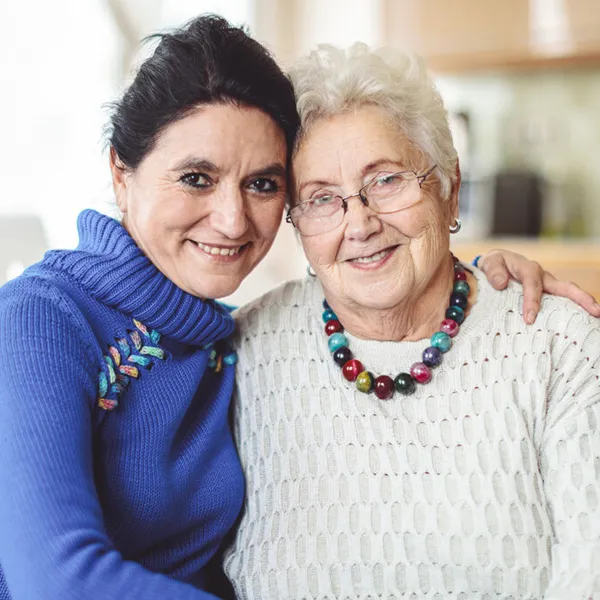
Your Gift Can Make 2x the Impact
Your Gift Can Make 2x the Impact
A gift can go twice as far during our February $100,000 2x Match. Your contribution by Feb. 27 will fuel Alzheimer’s research and help provide essential care and support.
Donate NowA diagnosis is the beginning – not the end – of the Alzheimer's journey
Lynnea Hutton is a human resources professional. She’s also an Alzheimer's caregiver. Those two worlds coincided with the diagnosis her mother received two years ago. Now, the vice president of People and Culture for the University of Colorado Foundation is seeing how the caregiving experience influences her human resources role.
When Lynnea Hutton’s mother, Roslyn Greene, was diagnosed with Alzheimer’s disease nearly two years ago, the family was told by the neurologist “there’s nothing more to do” other than lifestyle changes.
Hutton, who serves as the vice president of People & Culture for the University of Colorado Foundation, has seen more than her share of this incurable disease in her family, knew that her mother’s diagnosis wasn’t the last step. It was the first in what could be a long journey.

Her next move, on the recommendation of a friend, was to contact the Alzheimer's Association. That call has started a process that Hutton believes offers more hope or, at least, direction in dealing with her mother’s diagnosis.
A tragic family legacy
For Hutton, her mother’s Alzheimer's diagnosis was sadly too familiar. Her mother’s father had died from the disease while Hutton was a teenager, and her mother’s sister was recently diagnosed with vascular dementia. Hutton recalls watching her grandfather decline and her grandmother heroically trying to take care of him almost up until the end of his life. All her life, her mother was afraid of inheriting the disease, making this reality even more tragic.
Hutton’s familiarity with Alzheimer’s made her realize that her mother’s diagnosis was not the last step in their journey. The family has since sought a second opinion, and is exploring medication options since Hutton’s mother is still in the early stages of the disease. She was initially prescribed Aricept to treat Alzheimer’s symptoms, but there were issues with side effects. Hutton remains hopeful that her mother will benefit from one of the medications recently approved by the FDA that show promise in slowing the disease’s progression.
In the meantime, Hutton is participating in a virtual caregiver support group, and has become active in Alzheimer’s Association fundraising activities, including the Denver Walk to End Alzheimer’s, to help raise funds for the Association’s education programming and research to find a cure. Her mother and John, her mother’s husband and full-time caregiver, have started attending the early stages caregivers’ group. In addition, Hutton along with her family are researching options and planning for additional support as the disease progresses.
A view from Human Resources
“I work in human resources,” said Hutton, “so I understand how to navigate insurance benefits, but I will admit to having challenges helping my mom and her husband navigate through this,” particularly after the neurologist’s statement.
Hutton’s experience providing care for her mother and supporting John as the day-to-day caregiver have helped inform her role as a human resources professional. It is an important perspective that one can gain only when confronted with the challenges that being a caregiver for a loved one can present.
“Companies in general are used to seeing employees becoming new parents or caring for sick kids,” she said. “They’re not accustomed to hearing about caring for a parent – a situation that is becoming more prevalent. Now that I’m in this position, I’m more aware of the challenges. Medical leave is not enough. Long-term care insurance is not there on a regular basis. Few companies are ahead of the curve in this area.
“We don’t know what we don’t know until we’re in the moment,” Hutton said of her caregiving experience and learning more about Alzheimer's disease. “We’re not accustomed to looking ahead to care for our parents until we’re in the thick of it or in response to a crisis.”
Added risk for Black Americans
While there are 91,000 Coloradans among more than seven million Americans living with Alzheimer’s disease, the risk for Hutton and her family is greater than for most. Black Americans are twice as likely as whites to develop Alzheimer’s, while Hispanics are 50% more likely than whites. While researchers are still exploring the reasons, it is believed that higher rates of cardiovascular (heart and blood vessels) disease may play a role.
Facts about Alzheimer’s caregiving
Following are statistics about caregiving developed by the Alzheimer's Association:
- In 2023, 11.5 million family members and other caregivers of people living with Alzheimer’s or other dementias across the U.S. provided an estimated 18.4 billion hours of unpaid help valued at $346.6 billion (nearly 14 times the total revenue of McDonald’s in 2023 [$25.5 billion])
- In Colorado alone, 177,000 dementia family caregivers provided 307 million hours of unpaid care valued at more than $7.2 billion
- On average, volunteer caregivers provide nearly 31 hours of care per week or 1,612 hours per caregiver per year
- For 2024, the cost of providing professional care for people living with Alzheimer’s and other dementias in the U.S. was projected to reach $360 billion — a $15 billion increase from the prior year. This does not include unpaid care provided by family caregivers and friends
There are 91,000 Coloradans among seven million Americans living with Alzheimer’s disease. To learn more about the information, programs and services provided at no charge by the Alzheimer’s Association, go to alz.org or call the Association’s free Helpline, staffed 24/7 by trained professionals, at 800-272-3900.
